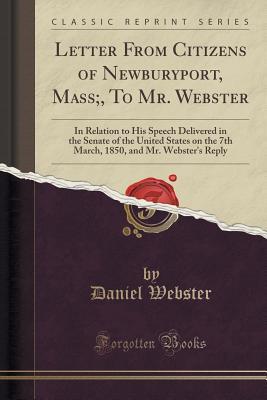- Bible
- Read the Bible
- Bible Versions
- Verse of the Day
- Reading Plans
- Verses by Topic
- Books of the Bible
- Bible Images
- Study
- Commentaries
- Concordances
- Dictionaries
- Encyclopedias
- Sermons
- Bible Atlas & Maps
- BP Wiki
- Devotionals
- Today's Devotionals
- Light of the World
- All Devotionals
- Inspirational Quotes
- More
- Picture Quotes
- Videos
- Inspirational
- Bible Study
- What The Bible Says
- Bible Q&As
- Daily Bread
- Bible by Genre
- Bible Stories
- Random Bible Verse
- Community
- Store
Excerpt from Letter From Citizens of Newburyport, Mass;, To Mr. Webster: In Relation to His Speech Delivered in the Senate of the United States on the 7th March, 1850, and Mr. Webster's Reply
It will be observed, that in neither of the two cases, does the law provide for the trial of any question, whatever, by jury, in the State in which the arrest is made. The fugitive from justice is to be delivered, on the production of an indictment, or a regu lar affidavit, charging the party with having committed the crime; and the fugitive from service is to be removed to the State from which he fled, upon proof, before any authorized magistrate, in the State where he may be found, either by witnesses or affidavit, that the person claimed doth owe service to the party claiming him, under the laws of the State from which he fled. In both cases, the proceeding is to be preliminary and summary; in both cases, the party is to be removed to the State from which he fled, that his liabilities, and his rights, may all be there regularly tried and adjudged, by the tribunals of that State, according to its laws. In the case of an alleged fugitive from justice, charged with crime, it is not to be taken for granted, in the State to which he has fled, that he is guilty. Nor in that State is he to be tried, or punished. He is.
About the Publisher
Forgotten Books publishes hundreds of thousands of rare and classic books. Find more at www.forgottenbooks.comwww.forgottenbooks.com
This book is a reproduction of an important historical work. Forgotten Books uses state-of-the-art technology to digitally reconstruct the work, preserving the original format whilst repairing imperfections present in the aged copy. In rare cases, an imperfection in the original, such as a blemish or missing page, may be replicated in our edition. We do, however, repair the vast majority of imperfections successfully; any imperfections that remain are intentionally left to preserve the state of such historical works.
It will be observed, that in neither of the two cases, does the law provide for the trial of any question, whatever, by jury, in the State in which the arrest is made. The fugitive from justice is to be delivered, on the production of an indictment, or a regu lar affidavit, charging the party with having committed the crime; and the fugitive from service is to be removed to the State from which he fled, upon proof, before any authorized magistrate, in the State where he may be found, either by witnesses or affidavit, that the person claimed doth owe service to the party claiming him, under the laws of the State from which he fled. In both cases, the proceeding is to be preliminary and summary; in both cases, the party is to be removed to the State from which he fled, that his liabilities, and his rights, may all be there regularly tried and adjudged, by the tribunals of that State, according to its laws. In the case of an alleged fugitive from justice, charged with crime, it is not to be taken for granted, in the State to which he has fled, that he is guilty. Nor in that State is he to be tried, or punished. He is.
About the Publisher
Forgotten Books publishes hundreds of thousands of rare and classic books. Find more at www.forgottenbooks.comwww.forgottenbooks.com
This book is a reproduction of an important historical work. Forgotten Books uses state-of-the-art technology to digitally reconstruct the work, preserving the original format whilst repairing imperfections present in the aged copy. In rare cases, an imperfection in the original, such as a blemish or missing page, may be replicated in our edition. We do, however, repair the vast majority of imperfections successfully; any imperfections that remain are intentionally left to preserve the state of such historical works.
BUY NOW
Paperback, 28 pages
Published September 4th 2018 by Forgotten Books (first published July 14th 2015)
© 2025 Bibleportal.com All rights reserved.

Daniel Webster was a leading American statesman during the nation's Antebellum Period. He first rose to regional prominence through his defense of New England shipping interests. His increasingly nationalistic views and the effectiveness with which he articulated them led Webster to become one of the most famous orators and influential Whig leaders of the Second Party System.
Daniel Webster was an attorney, and served as legal counsel in several cases that established important constitutional precedents that bolstered the authority of the Federal government. As Secretary of State, he negotiated the Webster-Ashburton Treaty that established the definitive eastern border between the United States and Canada.
Webster tried three times to achieve the Presidency; all three bids failed, the final one in part because of his compromises. Similarly, Webster's efforts to steer the nation away from civil war toward a definite peace ultimately proved futile. Despite this, Webster came to be esteemed for these efforts and was officially named by the U.S. Senate in 1957 as one of its five most outstanding members.
... Show more